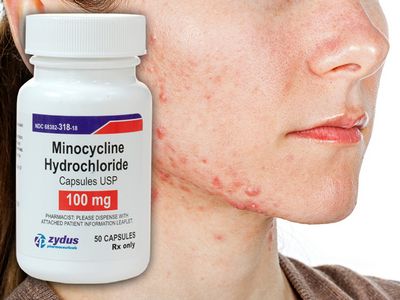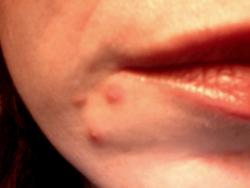Minocycline is an antibiotic prescribed to people with moderate acne.

It is also used to relieve symptoms associated with acne in patients with milder forms of acne.
Minocycline belongs to a family of antibiotics called Gram negative bacteria. They are commonly prescribed to prevent and treat infections by staph. Minocyclines are often used to reduce the severity of an infection, as well as for people who have had surgery, had immune deficiency diseases such as HIV/AIDS, or chemotherapy.
Minocycline has been approved by the US Food and Drug Administration for the treatment of acne in adults. Minocycline has been used in acne treatment studies for about 30 years. The FDA did not approve Minocycline for use in treating acne in children because of some reported serious side effects such as birth defects and heart problems.

However, Minocycline can be used safely as a treatment for mild to moderate acne.
Minocycline tablets are taken by mouth twice a day. Minocycline side effects may include:
– Nausea or vomiting – Headache – Dullness or change in the color of skin or eyes – Abnormal heart beat – Sudden headaches that do not go away – Pain and swelling of eyelids or around the eyes
The most serious side effect is the risk of developing blood clots in the legs, lungs, and kidneys. Minocyclines are known to cause fibrin clots in the veins in the legs and lungs, and if this occurs, it can lead to pulmonary embolism. In addition to these risks, Minocycline tablets have also been shown to increase the risk of a type of cancer called leukemia, especially in women.
Minocycline should not be used by pregnant women who may become pregnant during treatment. It should not be used by patients with HIV/AIDS because Minocycline can weaken the immune system and lower the white blood cell count in those people with HIV/AIDS.

Minocycline tablets are usually not recommended for patients with kidney or liver problems, because it can interfere with their absorption of iron.
Patients taking Minocycline should not stop taking the antibiotic without first consulting their doctor to make sure that there are no underlying medical conditions that may be causing the increased risk of heart failure, heart attack, or stroke. Minocycline may also increase the risk of experiencing severe heart irregularities such as chest pains, heart palpitations, dizziness, nausea, shortness of breath, sweating, or a feeling of impending death. Some people have also experienced a loss of consciousness and fainting and may vomit after taking Minocycline.
In order to determine if Minocycline may be dangerous to your health, you should discuss any serious health problems you have had in the past, such as seizures, depression, or heart problems. If you smoke cigarettes, the drug should be stopped for at least 6 months before starting Minocycline.
Minocycline is usually safe for use in small doses. If you notice that you are having symptoms of a serious side effect, tell your doctor right away, even if the symptoms last only a few days.

It is better to be safe than sorry.
People who take Minocycline often experience a decrease in heart rate and blood pressure while they are exercising. If this happens, your doctor may recommend lowering the dose or avoiding strenuous exercise for a short time until the side effects subside.
You should also avoid pregnancy or breastfeeding while using Minocycline because Minocycline can cause problems with the fetus. If you have taken Minocycline and breastfeed, be sure to check with your doctor or pharmacist if you should avoid breastfeeding for the first 48 hours after your dose. Women who are pregnant or plan to become pregnant should not take this drug. Also, Minocycline can interact with estrogen blockers, birth control pills, or hormone replacement therapy, and should not be used by people who have liver problems, heart disease, or heart problems that are not responding to conventional treatments.
If you are considering Minocycline for the treatment of acne or other severe heart problems, talk to your doctor about all of your options. Although this drug is generally considered safe, you should always discuss any medical concerns with your doctor before beginning a new medication.